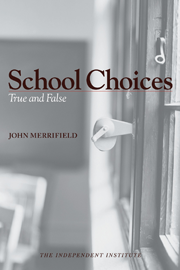Why is K-12 reform an unending, increasingly urgent process? Answer: Because the proposed reforms rarely address the underlying problems. Most proposals aim to improve the school system without fundamentally changing it.
Here are the widely ignored issues that demand attention. Public schools are accountable to government officials even though experience tells us that producers should be directly accountable to the people they serve. Humans are incredibly diverse, yet public schools aim to educate every child the same way. Specialization enhances productivity and the quality of services, but we preclude specialization by politicizing curriculum, textbook content, and by assigning everyone in a neighborhood to the same school.
Our policy of funding public schools rather than children presumes against a mountain of contemporary and historical evidence that competition is good for everything but K-12 schools. Even though the whole system is broken (“A Nation at Risk”)—public and private, combined—we debate whether poor children benefit from transfers to existing private schools. All that the data tell us is that most existing private schools produce slightly better, but still utterly unacceptable results, much more efficiently than public schools. The debate of adjustments to a fundamentally flawed system—things like class size and teacher training—completely denies much larger problems. It’s like debating whether we should put better tires and higher-octane fuel in a badly designed car.
Look at some current proposals, and alleged experiments. A Michigan ballot initiative and a new Florida program provides sub-par vouchers (the amount is less than what supports public school users) to users of low-performing schools. Such approaches have two major flaws.
First, they pretend that only a relatively few schools are low performing, even though nearly every child misses numerous easy questions on national tests and universities spend increasing millions on remedial courses. Second, by funding public school users at a much higher rate than private school users, they assert that some children and taxpayers are less important, and less entitled to the benefits of their taxes than others.
The Milwaukee and Cleveland low-income voucher programs pretend that the better suburban public schools and private schools are good. Sadly, better is usually still far from good. Again, they place the comfort of public school employees above the interests of children by capping voucher availability, and by issuing sub-par vouchers.
In addition, contrary to the media hype about the so-called Milwaukee and Cleveland “experiments,” they are too small and restrictive to test any significant aspect of a policy that could transform the system. The Florida and Milwaukee programs also contain a rarely recognized fatal flaw. They prohibit parents from supplementing (“adding on”) the voucher funds with their own money. That reduces parents’ choices, total education spending, the incentive to innovate, and the ability to develop and mainstream innovative practices.
Though California’s Proposition 38 and Governor Gary Johnson’s (R-NM) voucher proposals fund private school users at half the level of public school users, and thus still discriminate against private school users and limit the choices and well-being of children, they are by far the best reform proposals on the table. Since these voucher proposals are universal, and add-ons are allowed, they assure our diverse population of some of the specialization opportunities and competitive behavior that educators and children alike desperately need.
There are major differences in the skills and interests of educators and children. Market forces have an awesome track record (including in K-12 education) for producing constantly improving services as diverse as the buyers. So it follows that only a competitive system of universal parental choice that does not favor the users of some schools over others can match each child to a constantly improving, specialized school best for them.
California voters have a tough choice to make. Should they vote for Prop 38, realize significant gains, but risk locking in a flawed approach, or hold out for parental choice that does not favor public school users? The flaw is significant, but there is no guarantee that a better proposal will surface soon, and in the meantime the current system will continue to earn its reputation as Americans’ #1 concern, and keep proving that other types of reforms are just expensive acts of futility.








